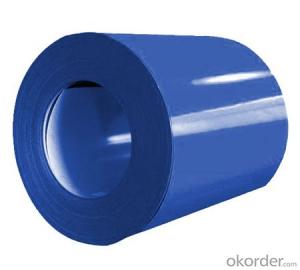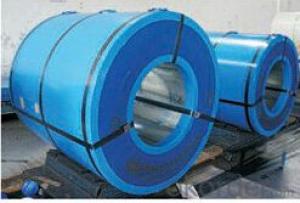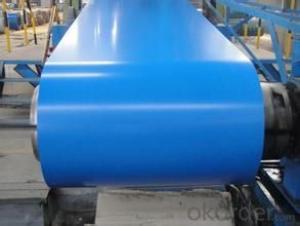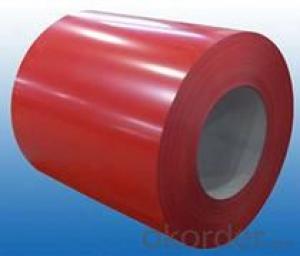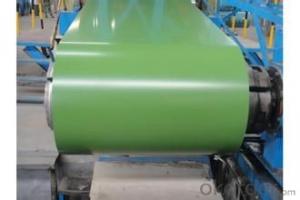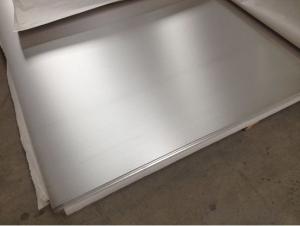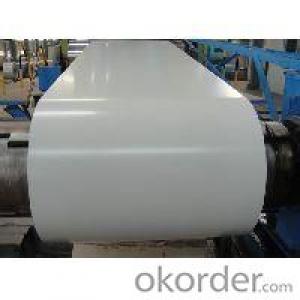Prepainted Galvanized Steel Coil Qualified-DX51D+Z
- Loading Port:
- China main port
- Payment Terms:
- TT or LC
- Min Order Qty:
- 50 m.t.
- Supply Capability:
- 15000 m.t./month
OKorder Service Pledge
OKorder Financial Service
You Might Also Like
1. Structure of Prepainted Galvanized steel Coil :
•Prepainted galvanized steel qualified with excellent decorative,corrosion resistance ,coating adhesion ,can keep for a long time as well as maintain fresh color .For color coated steel sheet can obtain good economic benefit by steel belt wood ,efficient in construction and save energy ,prevent pollution etc. Which is an ideal material for manufacturing board.
2.Main Features of Prepainted Galvanized steel Coil:
• Excellent process capability
• Smooth and flat surface
• Workability, durability
• Excellent heat resistance performance
3.Prepainted Galvanized steel Coil Images
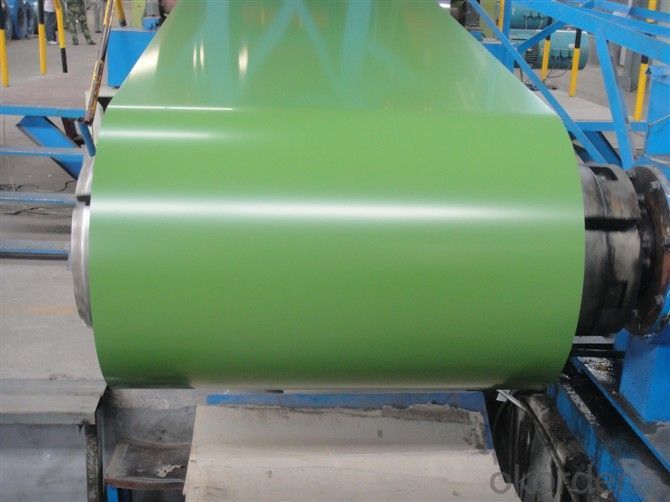
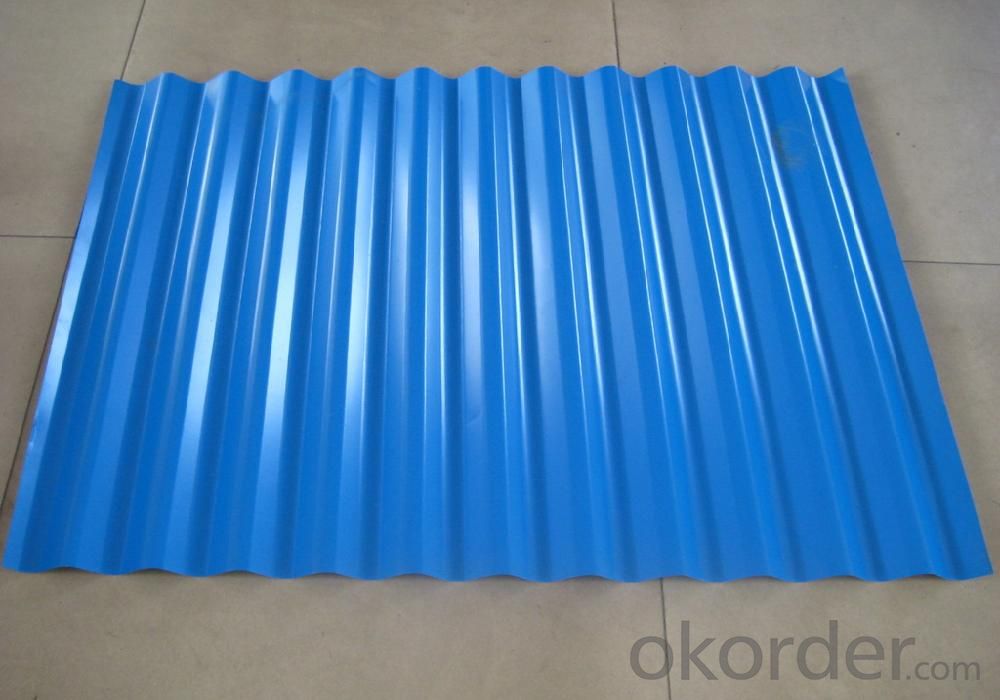
4.Prepainted Galvanized steel Coil Specification
Standard: ASTM, GB,JIS,JIS G3302 ASTM 755 EN10169
Grade: DX51D CGCC CS
Thickness: 0.18mm~1.2mm,
Width: 600-1250mm
Coil weight:3-12 MT
5.FAQ of Prepainted Galvanized steel Coil
1.How do you control your quality
We have established the international advanced quality management system,every link from raw material to final product we have strict quality test.
2.How long we will receive the goods ?
After receiving your deposit or workable lc ,our normal shipment date is 15-20days,and it takes around 28 days to reach your port of destination. But is up to different destination
- Q: How are steel coils used in the manufacturing of storage tanks?
- Steel coils are used in the manufacturing of storage tanks as they serve as the primary material for constructing the tank shell. The coils are processed and shaped into cylindrical sections, which are then welded together to form the tank. This ensures strength, durability, and leak-proof construction, making steel coils an essential component in the fabrication process of storage tanks.
- Q: What is the maximum tension that steel coils can withstand during uncoiling?
- The maximum tension that steel coils can withstand during uncoiling depends on various factors such as the type and thickness of the steel, the diameter and width of the coil, and the specific application. However, in general, steel coils can typically withstand tensions ranging from a few hundred pounds to several thousand pounds. It is important to consult the manufacturer's specifications or conduct specific tests to determine the exact maximum tension for a particular steel coil.
- Q: I found this amazing kid on youtube - is he using nylon or steel strings?(I'm buying my first guitar! helpp)oh and is fingerstyle also possible in steel string guitar? does it hurt?(I might sound really stupid-..)thanks a lot
- In that video, he is using a steel-string acoustic guitar. However, when choosing between a nylon string guitar and a steel string guitar, you must consider a few things. Steel-string guitars are more painful in the beginning for the fretting hand, but that means you'll have more strength in your fingers faster. Nylon-string guitars are easier on the fingers and sound much smoother and calmer than steel-string guitars. Also, nylon-string guitars have a wider neck and that neck meets the body at the twelfth fret, while most steel-string guitars have a thinner neck that meets the body at the fourteenth fret. Have fun with your first guitar! :)
- Q: ok I got a dpms ar 15 and all i have put though it is good brass 223 ammo but is it ok to shoot the old crappy steel cased wolf ammo out of it will it hurt its function or will it hurt it cosmetically?
- The primary complaint about wolf steel cased stuff besides it being dirty is that is wears out the chamber and extractor faster than brass. That is not true. It would be true if the cases were actually steel instead of a mixture that has a hardness that is close to brass. Now to prove how pervasive this myth is I expect a minimum of 4 thumbs down for this statement alone. In any case the only issue is that is you do use steel cased ammo the chamber has to be better cleaned. The residue left behind from the coating on the steel casings will build up. If you keep firing the cheap steel cased stuff this tend to be less of an issue but when you use brass cased ammo without cleaning the chamber out or in the same session once it heats up the stuff will actually grip the brass tightly causing case head tears. And your only option is to wait for the gun to cool down yank it out by hand because at that point the casing is in essence glued into the chamber.
- Q: I do a lot of scrapping and would like to be able to separate stainless steel from regular steel. The magnet test doesn't always work since stainless can be magnetic, but what are some ways that I can for sure tell the difference? Or even something like a sound that they make that may help me to tell the difference.
- Stainless steel uses chromium in its mixture to thwart the affects of corrosion. General steel, or carbon steel, is generally almost completely iron and is used for far greater applications than stainless steel. Stainless steel is used mostly in kitchen appliances, utensils, etc... The best thing I can come up with is to find a way to measure the chromium content of the steel you are looking at. If it's around 3% chromium, it's probably standard steel. If it's somewhere between 10-15% chromium it's probably stainless steel (or even 4% plus). I can't tell you a fast and quick way to test the steel because from my research, it appears there are as many grades and allows of steel as there are uses for steel! There is one test I've seen for home testing surgical steel which is a higher grade stainless steel, that is to put scotch tape on one section of material then soak it in water for a 24 hour period, then let it air dry for 24 hours. You remove the tape and lightly polish the exposed areas to see if there was any discoloration or pitting on the exposed area. This test is mainly for surgical steel jewelry, however stainless steel is supposed to resist rusting more than standard steel, hence it might work for other steel types as well. You may have to read some of the other links below to get some other ideas on how you can test steel to see if it is stainless.
- Q: What are the different types of steel coil cutting tools?
- There are several types of steel coil cutting tools, including slitting shears, rotary slitters, flying shears, and laser cutters. Each tool is designed to cut steel coils into specific shapes and dimensions, depending on the desired end product.
- Q: What are the different types of steel coil cutting blades?
- Various types of steel coil cutting blades exist, each specifically designed for particular cutting purposes. 1. Slitting Blades: These blades are utilized to cut steel coils into narrow strips. They possess a straight cutting edge and come in different widths to accommodate various slitting needs. Industries like automotive, construction, and metal fabrication commonly employ these blades. 2. Shearing Blades: These blades are created to cut steel coils into flat sheets. They feature a curved cutting edge that enables a clean and precise cut. Steel service centers, where large coils are transformed into flat sheets for further manufacturing processes, frequently utilize shearing blades. 3. Circular Blades: Also known as rotary blades, these blades are employed for continuous cutting of steel coils. With a circular shape adorned with sharp teeth along the edge, they can effectively cut through the coil as it passes through the cutting machine. Industries such as packaging, printing, and paper manufacturing often make use of circular blades. 4. Guillotine Blades: These blades are employed to cut steel coils in a straight downward motion. Possessing a vertically moving straight cutting edge, they can effectively slice through the coil. Guillotine blades are frequently used in heavy-duty cutting applications that involve thick steel coils or large quantities of material. 5. Slitter Knives: Similar to slitting blades, slitter knives are typically smaller and employed in slitting machines that require multiple blades. Industries requiring high-precision slitting, such as electrical transformer production or precision metal stamping, often rely on slitter knives. Each type of steel coil cutting blade possesses unique characteristics and designs that render them suitable for specific cutting tasks. The appropriate blade selection depends on factors like steel coil thickness and width, desired cut quality, and specific application requirements.
- Q: y does 1095 steel on a katana weight about a pound less for the same amount than 1045? the 1095 is better right? but then why is 1045 steel more comenly used for practical use than 1095, even though i no its cheaper to use 1045 for tami mats. so is 1095 steel the better investment for buying and minor tami mat use?
- 1045 is a medium carbon steel is used when greater strength and hardness is desired than in the as rolled condition. Extreme size accuracy, straightness and concentricity combine to minimize wear in high speed applications. 1095 is a high carbon steel, but does not hold as sharp an edge. 1095 high carbon steel is harder and more durable than 440C stainless steel, but will rust much more easily. Stainless steel is more brittle than both 5160 and 1095 carbon steel, but is still very useful due to its resistance to rust and corrosion.
- Q: How are steel coils used in the manufacturing of HVAC systems?
- Steel coils are used in the manufacturing of HVAC systems primarily for heat transfer purposes. They are typically used in air conditioning and refrigeration systems to facilitate the transfer of heat between the refrigerant and the surrounding air. The coils, usually made of copper or aluminum tubes with steel fins, are designed to maximize the surface area available for heat exchange, allowing for efficient cooling or heating of the air passing through the system.
- Q: What are the common applications of galvalume steel coils?
- Due to their unique properties and durability, galvalume steel coils are widely used in various applications. These coils are highly versatile and can be utilized in different industries. Some common uses of galvalume steel coils include: 1. Roofing: Galvalume steel coils are commonly employed in the construction industry for roofing purposes. The protective coating on these coils offers exceptional resistance against corrosion, making them an ideal choice for safeguarding roofs from harsh weather conditions and extending their lifespan. 2. Siding: Galvalume steel coils are also extensively used for siding applications in residential, commercial, and industrial buildings. The durability of these coils enables them to withstand external elements such as rain, wind, and sunlight without corroding or deteriorating. 3. Gutters and Downspouts: Galvalume steel coils are widely utilized in gutter and downspout systems. The corrosion-resistant properties of these coils ensure that gutters and downspouts remain functional and visually appealing for an extended period, eliminating the need for frequent replacements or repairs. 4. Appliances: Many household appliances, including refrigerators, ovens, and washing machines, incorporate galvalume steel coils. These coils' corrosion resistance and high heat reflectivity make them an excellent choice for manufacturing durable and energy-efficient appliances. 5. Automotive Industry: The automotive industry utilizes galvalume steel coils in the production of various parts such as body panels, chassis, and exhaust systems. The lightweight nature and corrosion resistance of these coils contribute to fuel efficiency and the overall durability of vehicles. 6. HVAC Systems: Heating, ventilation, and air conditioning (HVAC) systems often employ galvalume steel coils for components like ductwork and air handling units. The coils' ability to withstand high temperatures and resist corrosion ensures the longevity and efficiency of HVAC systems. 7. Agricultural Equipment: Galvalume steel coils are utilized in the manufacturing of agricultural equipment, including grain storage bins, barns, and sheds. These coils provide excellent protection against rust, ensuring that the equipment remains durable and reliable in agricultural environments. In conclusion, galvalume steel coils have a wide range of applications in various industries due to their corrosion resistance, durability, and ability to withstand harsh environmental conditions. These coils are highly sought after for their exceptional properties and are an essential component in many different sectors.
Send your message to us
Prepainted Galvanized Steel Coil Qualified-DX51D+Z
- Loading Port:
- China main port
- Payment Terms:
- TT or LC
- Min Order Qty:
- 50 m.t.
- Supply Capability:
- 15000 m.t./month
OKorder Service Pledge
OKorder Financial Service
Similar products
Hot products
Hot Searches
Related keywords
